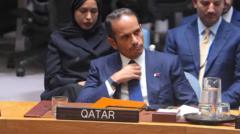Why Did the EU Extend Sanctions on Individuals Tied to Russia's War in Ukraine?

Published: 2025-09-12 10:16:51 | Category: politics diplomacy GNEWS Search
The European Union (EU) has decided to extend sanctions against individuals and entities linked to Russia's ongoing conflict in Ukraine for another six months, following a unanimous agreement among member states. This extension is part of the EU's broader strategy to pressure Moscow through various sanctions, which include freezing assets and imposing travel bans. The latest roll-over of sanctions, which affects over 2,500 individuals and entities, reflects the EU's commitment to its stance against Russia's actions in Ukraine.
Last updated: 12 September 2023 (BST)
Understanding the EU's Sanctions Against Russia
The sanctions imposed by the EU are a response to Russia's actions in Ukraine, which began in 2014 and escalated significantly in 2022. These measures are designed to exert economic pressure on the Russian government and its affiliates, aiming to deter further aggression and destabilisation in the region. The sanctions framework includes both targeted individual measures and broader sectoral restrictions.
Key Takeaways
- The EU has extended sanctions against Russia by another six months.
- Over 2,500 entities and individuals are currently subject to these sanctions.
- Sanctions can include asset freezes and travel bans.
- Unanimous agreement among member states is required for renewal.
- Hungary has previously challenged the sanctions, though no delistings occurred this time.
What Are the Types of Sanctions Imposed?
The EU employs two main frameworks for sanctions against Russia:
- Targeted sanctions: These are aimed at specific individuals and entities, including government officials, business leaders, and organisations that support the Russian state.
- Sectoral sanctions: These measures target entire sectors of the Russian economy, such as finance, energy, and defence. A notable example is the price cap imposed on Russian oil exports.
The Process of Renewing Sanctions
Sanctions must be renewed every six months and require the unanimous agreement of all EU member states. This process can be complex, as evidenced by Hungary's previous demands for delistings, which have occasionally stalled the renewal of sanctions. In this latest instance, however, reports indicate that no political delistings were made, allowing the sanctions to be rolled over smoothly.
The Role of Hungary in the Sanction Process
Hungary's position within the EU has often led to friction regarding sanctions against Russia. The country has previously called for the removal of certain individuals from the sanctions list, citing economic considerations and diplomatic relations. Despite these challenges, the latest renewal of sanctions was achieved without any concessions, highlighting a united front among member states.
Impact of the Sanctions
The impact of the EU's sanctions on Russia has been significant, affecting various aspects of the Russian economy. By freezing assets and imposing travel bans, the EU aims to isolate key figures and destabilise the financial support for the Russian government. The sectoral sanctions, particularly those targeting the oil industry, have also contributed to a decline in Russia's revenue from oil exports, which is a critical source of funding for its military operations.
Economic Ramifications for Russia
According to various reports, the sanctions have led to a notable decline in foreign investment in Russia and have hampered its ability to access international financial markets. The EU's measures, alongside those from other countries, have created a challenging environment for the Russian economy, which is grappling with reduced growth and increased inflation.
Future of EU Sanctions Against Russia
As the conflict in Ukraine continues, the EU is likely to maintain its sanctions regime. The situation remains fluid, with ongoing discussions about the effectiveness of current measures and potential future actions. Analysts suggest that the EU may consider expanding its sanctions to include additional sectors or individuals if the situation escalates further.
What Happens Next?
The EU's next review of sanctions will be crucial in determining the direction of its policy towards Russia. Member states will need to assess the impact of existing sanctions, consider the political landscape in Ukraine, and respond to any changes in Russia's actions. The ongoing conflict may necessitate further adjustments to the sanctions framework to ensure it remains effective in achieving its objectives.
Conclusion
The extension of sanctions against Russia underscores the EU's commitment to supporting Ukraine in its fight against aggression. As the situation unfolds, the EU will continue to navigate the complexities of international diplomacy while ensuring that its measures align with its strategic goals. The effectiveness of these sanctions will depend on continued unity among member states and the ability to adapt to changing circumstances on the ground.
What further actions might the EU take if the situation in Ukraine escalates? As the conflict continues, the global community watches closely. #EUSanctions #RussiaUkraineConflict #InternationalRelations
FAQs
What are EU sanctions against Russia?
EU sanctions against Russia are measures taken to restrict trade and financial activities with Russian entities and individuals due to its actions in Ukraine. These include asset freezes and travel bans.
How often are EU sanctions renewed?
EU sanctions are subject to renewal every six months, requiring unanimous agreement from all member states to extend them.
What types of sanctions does the EU impose?
The EU imposes targeted sanctions on specific individuals and sectoral sanctions on entire industries, such as energy, finance, and defence, to exert economic pressure on Russia.
What role does Hungary play in the sanctions process?
Hungary has previously challenged the renewal of EU sanctions against Russia, calling for delistings. However, in the latest extension, no political delistings were made, showing a consensus among member states.
What impact do sanctions have on Russia's economy?
Sanctions have significantly affected Russia's economy, leading to reduced foreign investment, restricted access to international financial markets, and a decline in revenues from oil exports.



